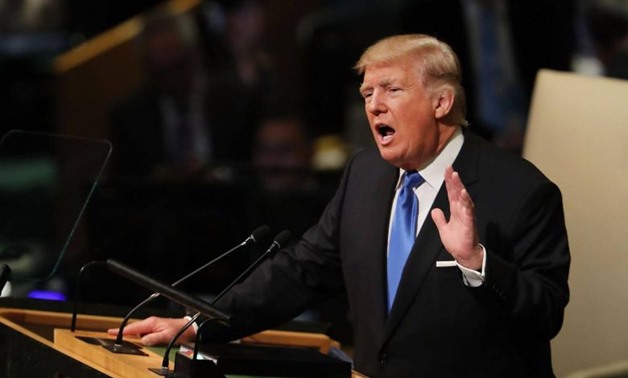
President Donald Trump - File Photo
WASHINGTON - 6 October 2017: Challengers to President Donald Trump's travel ban targeting several Muslim-majority countries on Thursday urged the U.S. Supreme Court to decide the policy's legality even though it has been replaced with a revised plan.
In separate letters to the court, the American Civil Liberties Union and the state of Hawaii said the justices should still hear the case, which had been scheduled for arguments next week but was taken off their calendar after the administration announced the reworked ban last month.
The challengers, characterizing the new ban as an indefinite extension of the previous one, said individuals who sued have an interest in the expired measure being declared unlawful because they continue to be harmed by the new policy.
Hawaii also told the court in a separate letter that it intended to challenge Trump's latest travel ban by seeking on Friday to amend its existing lawsuit against the previous one.
The Justice Department urged the justices not to hear the case, to throw out earlier lower court rulings that had invalidated the ban and to order that the legal challenges be dismissed.
Trump's three successive moves to block entry into the United States by people from several predominantly Muslim countries have been among his most contentious acts since taking office in January. Trump had promised as a candidate "a total and complete shutdown of Muslims entering the United States."
The ACLU told the court that the plaintiffs who sued to stop the policy "retain an all-too-real stake in the outcome of the case" even though the original 90-day travel ban on people from six countries expired on Sept. 24. That order was signed by Trump in March and was enacted with some changes in June with the high court's blessing.
The justices on Sept. 25 asked all the parties to file court papers expressing views on whether the case was moot, meaning there was nothing left to decide, because the temporary ban expired.
That ban had targeted people from Iran, Libya, Syria, Yemen, Somalia and Sudan. The new open-ended ban announced in a presidential proclamation on Sept. 24 removed Sudan from the list and blocked people from Chad and North Korea and certain government officials from Venezuela from entering the United States.
Among the issues raised by the challengers is whether the ban discriminated against Muslims in violation of the U.S. Constitution's prohibition on the government favoring or disfavoring a particular religion.
REFUGEE BAN
A separate 120-day ban on refugees entering the United States that was part of Trump's March order expires on Oct. 24.
Hawaii's lawyers said that even if the high court decided not to issue a ruling, it should still leave the lower court decisions in place. To do otherwise would allow the administration to effectively win the case by erasing rulings that had gone against Trump, Hawaii argued.
The Justice Department said that it wants the lower court rulings tossed because the challengers will otherwise cite them in new litigation against Trump's reworked ban.
"The lower courts should be considering challenges to the proclamation anew based on its text, operation, and findings," Justice Department lawyers wrote.
The weekly behind-closed-doors meeting in which the justices consider next steps in cases before them is scheduled for Friday morning. The court could make an announcement at any time.
The new ban could affect tens of thousands of potential immigrants and visitors to the United States. Opponents have said that like the earlier two orders from January and March, it was still effectively a "Muslim ban."
Even if the Supreme Court dismissed the older case, it may still have to weigh in on the issue in the future. Various challengers have filed suit against the reworked ban, and those cases potentially could reach the high court.
Comments
Leave a Comment